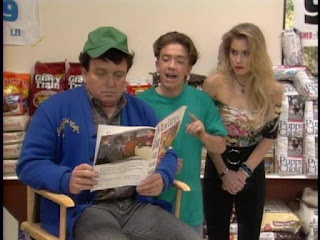When I was a kid, I would sometimes watch Leave It to Beaver as reruns. I seem to recall it was in a pretty heavy syndicated rotation even before my family got cable, meaning the show had ended a little shy of twenty years earlier. I'm certain that I had little real understanding of precisely when the show aired in the relative history of the United States, other than maybe some vague sense that it was from a time before I was born. It bore a close enough resemblance to the society I knew in the late 1970s and early 1980s that it seemed familiar, but different enough that even as a kid, I could recognize it was from a different era. Compared to, say, Wagon Train which debuted the same year but showcased a lifestyle wholly foreign to me. Dad worked and Mom stayed home to mind the house; kids rode bikes and played catch in the front yard. The Cleaver family had most of the same household technology we did; they had a car and refridgerator and telephone and record player... I don't think we ever saw a television in their home, but I don't think it was conspicuously absent either. They clearly didn't have video games or computers like our Atari 2600 or Commodore Vic-20, but it still portrayed a household that was more-or-less recognizable, as I said.
It occurred to me yesterday that Married with Children has now been off the air for twenty-five years. Meaning that a ten-year-old watching that today would likely see it in that same familiar-but-clearly-from-a-different-era light that I originally watched Leave It to Beaver. Watching television in the living room was a daily, wind-down-from-a-lousy-day-at-work activity. Computers were a thing, but they weren't common and they were all chunky beige boxes. At least as often as not, meals were eaten on the couch, not at the table. You could still afford a house and raise two kids on a single income, but only just.
As is referenced on the Married with Children episode in which Jerry Mathers appears, there's a running joke that all of the kids confuse him with other child actors from loosely the same time period. Similarly, a kid today might easily confuse Davd Faustino with Jonathan Taylor Thomas or Rider Strong. That's all ancient history as far as they're concerned. For as much as I might have viewed those actors and those shows as cultural touchstones of the day, they're now just vague reflections of a bygone era that all blur together in a sometime-well-before-now jumble that also includes basically anything pre-9/11. The original Star Wars from 1977 is side-by-side with Terminator from 1984 and Independence Day from 1996.
While none of that is comics related, I think it's worth the reminder to emphasize that the comics you saw as absolutely seminal in 1986 -- Watchmen, The Dark Knight Returns, and Maus -- are not the cultural touchstones to anyone born after that. They're ancient history to any 25-year-old buying Detective Comics today. The art styles and storytelling techniques and the language and even the purchasing experiences are all different in comics now than they were then. So while it certainly is useful to know about those things and to learn and/or remember how we got to where we are today, that is NOT where most comics reading audiences -- the ones who have grown up with the works of Raina Telegemeier and Kazu Kibuishi -- are coming from.
The Cleavers, the Bundys, and Watchmen
By Sean Kleefeld | Thursday, June 22, 2023
1 comment







1 comments:
Wow, this is pretty misinformed. Who do you think actually reads these comics? Your average reader can discern quality, hence the overall decline in sales over the past decade. The classics are classic not because of their context, but because of their quality. Your trite dismissal is useless and insular.
Post a Comment